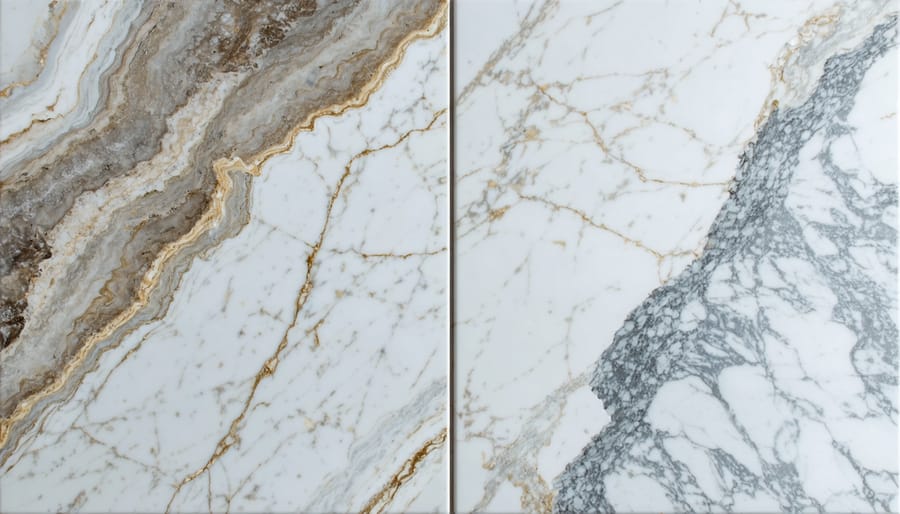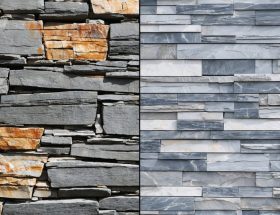The age-old debate between natural stone and quartz countertops represents one of the most significant decisions in modern kitchen and bathroom design. While both materials offer exceptional beauty and functionality, their distinct characteristics create unique advantages that cater to different lifestyle needs and aesthetic preferences.
Natural stone, carved from the earth’s crust over millions of years, brings unmatched character and one-of-a-kind patterns to your space. Each slab tells its own geological story through unique veining, color variations, and mineral compositions. Quartz, engineered with precision using 90-95% ground natural quartz combined with resins and pigments, offers consistent patterns and virtually maintenance-free durability that appeals to busy households.
For homeowners facing this choice, understanding the key differences in durability, maintenance requirements, and long-term value isn’t just about aesthetics—it’s about making an investment that aligns with their lifestyle and home’s future value. Whether you’re renovating your kitchen, updating a bathroom, or designing a new home, this comprehensive comparison will help you navigate the distinct advantages and considerations of each material to make an informed decision that you’ll appreciate for years to come.
Understanding Natural Stone Countertops
Popular Natural Stone Varieties
Natural stone countertops offer a stunning array of options, each with unique characteristics and appeal. Granite remains one of the most popular choices, celebrated for its exceptional durability and diverse color patterns. Available in hundreds of varieties, granite showcases distinctive mineral compositions that create unique speckled or veined appearances, from subtle whites to dramatic blacks.
Marble, with its timeless elegance, features distinctive veining patterns that have captivated designers for centuries. While softer than granite, marble’s luxurious appearance makes it particularly appealing for showcase kitchens and bathrooms. Classic white Carrara and cream-colored Calacatta are among the most sought-after varieties.
Quartzite, often confused with manufactured quartz, is a natural stone that offers granite-like durability with marble-like aesthetics. Its crystalline structure produces striking patterns and exceptional strength. Other notable options include travertine, known for its warm, earthy tones and unique pitted surface, and soapstone, which features a smooth, matte finish that darkens beautifully over time.
Each natural stone variety weathers and ages differently, developing a distinct character that manufactured materials simply cannot replicate.
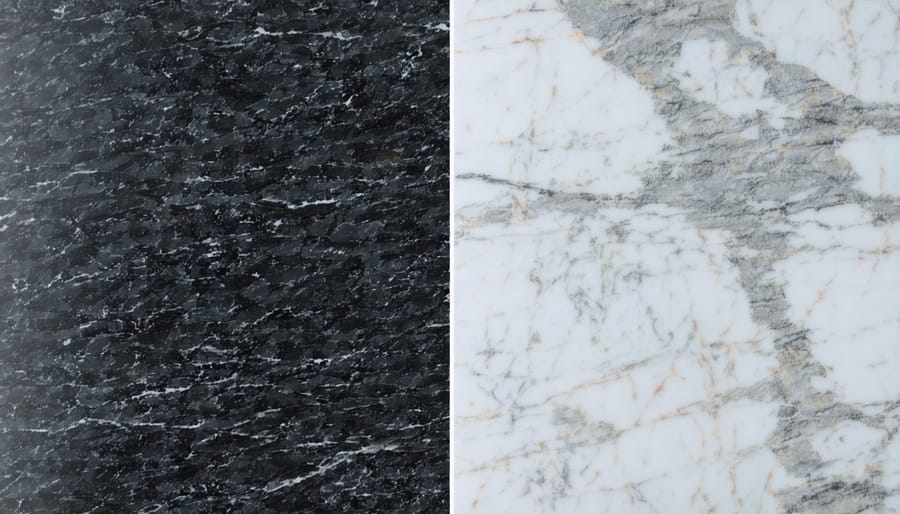
Natural Stone Benefits
Natural stone countertops offer distinct advantages that have made them a coveted choice for centuries. The timeless elegance of natural stone brings unique character to every installation, as no two slabs are exactly alike. Each piece tells its own geological story through intricate veining, color variations, and crystalline structures formed over millions of years.
Beyond aesthetics, natural stone delivers exceptional heat resistance, making it ideal for busy kitchens. Granite, for instance, can withstand hot pots and pans without damage. Natural stone also adds significant value to your property, with many real estate professionals citing it as a desirable feature for potential buyers.
The material’s durability is remarkable when properly sealed and maintained, often lasting several decades or even a lifetime. Additionally, natural stone’s ability to be repaired and refinished means that minor damages can be addressed without replacing the entire countertop, making it a sustainable long-term investment for your home.
Quartz Countertops Explained
Composition and Manufacturing
Natural stone countertops are quarried directly from the earth, cut into slabs, and finished with minimal processing. In contrast, engineered quartz countertops are manufactured through a sophisticated process that combines approximately 90-93% ground natural quartz with 7-10% polymer resins and pigments.
The manufacturing process begins by crushing and grinding pure quartz crystals into fine particles. These particles are then mixed with binding resins, typically polyester or acrylic, along with color pigments and occasional recycled materials. This mixture is compressed under intense pressure and heat, creating a non-porous, highly durable surface.
During this process, manufacturers can control the appearance, pattern, and color consistency of the final product – something impossible with natural stone. However, this engineered composition also affects the material’s quartz temperature sensitivity, making it less resistant to extreme heat compared to natural stone.
The resulting slabs are then polished and cut to size, offering consistent patterns and colors throughout each piece, unlike the unique variations found in natural stone slabs.
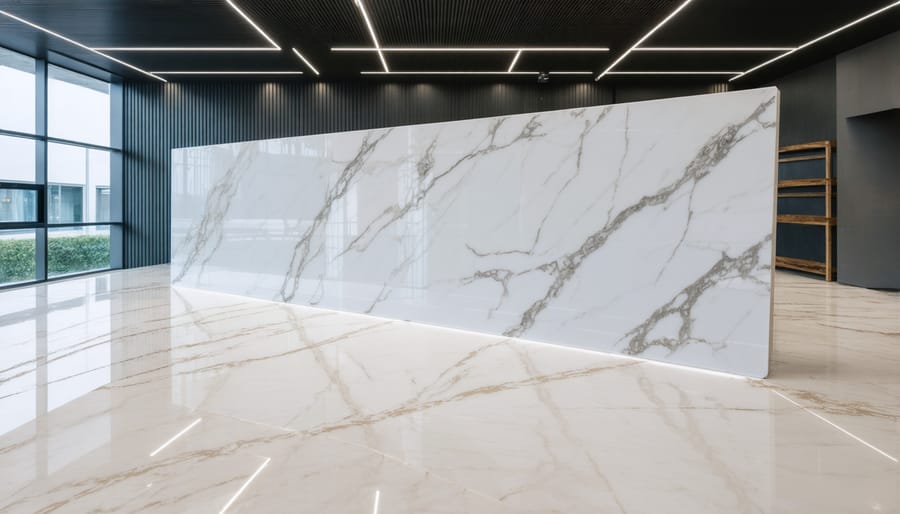
Quartz Benefits
Quartz countertops offer several compelling advantages that make them a popular choice for modern homes. These engineered surfaces combine natural quartz crystals with resins and pigments to create a highly durable material that’s virtually maintenance-free. Unlike natural stone, quartz never needs sealing and resists stains, scratches, and bacteria growth.
The non-porous nature of quartz makes it exceptionally hygienic, making it ideal for kitchen environments where food preparation occurs. Spills can be easily wiped clean without fear of permanent staining, and the surface won’t harbor harmful bacteria or mold.
Another significant benefit is the consistency in appearance. Since quartz is engineered, homeowners can choose from a wide range of colors and patterns with the confidence that what they see in the showroom will match exactly what’s installed in their home. This uniformity is particularly appealing for large projects requiring multiple slabs.
Quartz also offers excellent heat and impact resistance, though using trivets for hot pots is still recommended. With proper care, these countertops can maintain their beauty for decades without showing signs of wear.
Head-to-Head Comparison
Durability and Maintenance
Both natural stone and quartz countertops offer impressive durability, but they have distinct maintenance requirements. Natural stone, particularly granite and quartzite, resists heat exceptionally well and can last for generations when properly maintained. However, these materials require periodic sealing to prevent staining and maintain their protective barrier against moisture.
Quartz countertops, being engineered products, don’t require sealing and are generally more resistant to staining due to their non-porous nature. They’re highly durable and resist scratches well, though they can be damaged by excessive heat and prolonged exposure to direct sunlight.
Daily maintenance for both materials involves wiping with mild soap and water. Natural stone requires specific pH-neutral cleaners to protect its surface, while quartz can handle a wider range of cleaning products. However, harsh chemicals should be avoided on both surfaces.
For natural stone, addressing chips or scratches often requires professional intervention, though the repairs can restore the surface to its original beauty. Quartz repairs are less common but can be more challenging since the material cannot be refinished like natural stone.
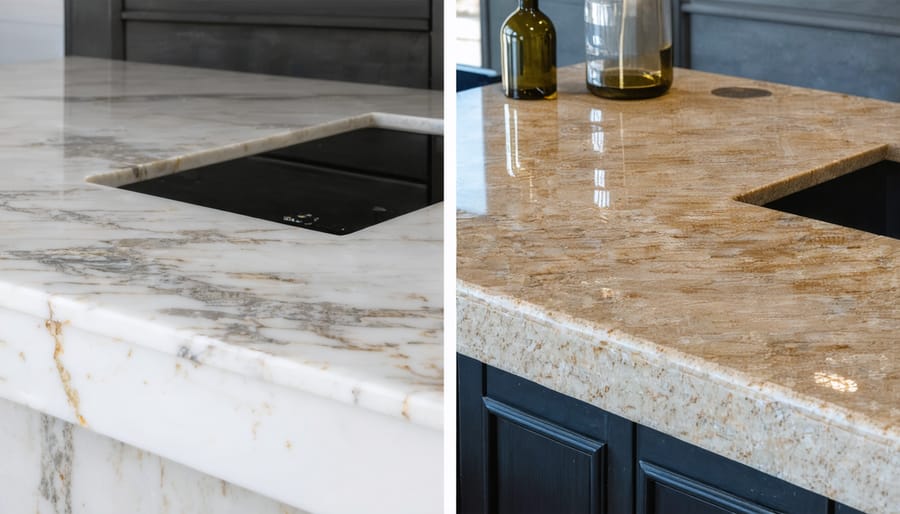
Aesthetics and Design Options
Natural stone countertops offer unique, one-of-a-kind patterns and color variations that reflect their geological origins. Each slab of granite, marble, or quartzite tells its own story through distinctive veining, speckles, and mineral compositions. This natural variation means no two installations are exactly alike, creating truly exclusive spaces.
Quartz countertops, while engineered, provide consistent and predictable patterns. Manufacturers can produce a wide range of colors and designs, including options that closely mimic natural stone. The controlled manufacturing process allows for uniform appearance throughout the surface, which some homeowners prefer for achieving a specific design vision.
Both materials can complement various design styles. Natural stone tends to excel in traditional, rustic, or luxury settings, where its organic characteristics enhance the aesthetic. Quartz, with its versatile design options, works well in contemporary, modern, or transitional spaces. Its ability to maintain consistent coloring makes it particularly suitable for large installations where pattern matching is important.
The choice between natural stone and quartz often comes down to personal preference – whether you value the authenticity and uniqueness of natural materials or prefer the predictability and design control of engineered surfaces.
Cost Analysis
When comparing costs between natural stone and quartz countertops, several factors come into play. Natural stone prices typically range from $40 to $200 per square foot installed, with premium materials like rare marble commanding higher prices. Understanding natural stone pricing considerations is crucial for budget planning. Quartz countertops generally fall between $50 and $120 per square foot installed, offering more predictable pricing.
Initial installation costs tell only part of the story. Natural stone requires periodic sealing, typically every 1-2 years, adding approximately $200-400 per application. Quartz, being non-porous, doesn’t need sealing, resulting in lower maintenance costs. However, when damaged, quartz repairs often require complete replacement, while natural stone can usually be restored through professional repair services.
Long-term value favors natural stone, as it typically increases property value and maintains its appeal over time. While the upfront investment might be higher, proper maintenance can extend its lifespan indefinitely, making it a cost-effective choice for homeowners planning to stay in their homes long-term.
Environmental Impact
Natural stone countertops boast significant environmental advantages, as they require minimal processing and are sourced directly from the earth. Their extraction and fabrication processes typically consume less energy compared to manufactured alternatives. Additionally, natural stone offers indoor air quality benefits since it emits no volatile organic compounds (VOCs).
Quartz countertops, while durable, have a more complex environmental footprint. Their manufacturing process involves combining natural quartz with synthetic resins and pigments, requiring more energy and chemical processes. However, some manufacturers are making strides in sustainability by incorporating recycled materials and implementing eco-friendly production methods.
Both materials offer impressive longevity, which reduces the need for replacement and minimizes long-term environmental impact. Natural stone can be recycled or repurposed at the end of its life, while engineered quartz presents more recycling challenges due to its resin content. When considering environmental impact, it’s worth noting that transportation distances from quarry to installation site can significantly affect the carbon footprint of either option.
Making Your Decision
Best Applications for Natural Stone
Natural stone countertops shine in several specific applications where their unique characteristics provide distinct advantages. In luxury homes and high-end residential projects, natural stone’s one-of-a-kind patterns and organic variations create an unmatched sense of elegance and authenticity. Each slab tells its own story, making it perfect for homeowners seeking truly unique spaces.
Historic renovations particularly benefit from natural stone, as it maintains architectural authenticity and period-appropriate aesthetics. Materials like marble and limestone have been used for centuries, making them ideal choices for preserving historical integrity while providing modern functionality.
Outdoor kitchens and living spaces are another prime application for natural stone. Granite, in particular, withstands environmental exposure exceptionally well, resisting UV damage and maintaining its appearance despite weather variations. Its natural origins make it perfectly suited for seamlessly blending indoor and outdoor living spaces.
Statement pieces and focal points in design schemes often call for natural stone. Islands, bathroom vanities, or dramatic fireplace surrounds benefit from the dramatic veining and character that only natural materials can provide. These showstopping elements become conversation pieces that elevate the entire space.
Additionally, natural stone is ideal for projects where sustainability and eco-friendly materials are priorities. As a product quarried directly from the earth without synthetic additives, it appeals to environmentally conscious consumers seeking natural building materials.
When to Choose Quartz
Quartz countertops are an excellent choice for high-traffic kitchens and spaces where practicality takes precedence. If you’re seeking a low-maintenance solution, quartz eliminates the need for periodic sealing and offers superior stain resistance compared to natural stone options. This makes it particularly suitable for busy families with young children or households where spills and acidic substances are common concerns.
For those who prioritize consistency in appearance, quartz delivers predictable patterns and uniform coloring throughout the entire surface. This characteristic is especially valuable in modern design schemes or when matching multiple countertop sections across a large kitchen space. The material’s non-porous nature also makes it inherently more hygienic, making it an ideal choice for food preparation areas and bathroom vanities.
Budget-conscious homeowners who want a long-term investment might find quartz appealing due to its durability and lower lifetime maintenance costs. While the initial investment may be comparable to natural stone, the reduced need for maintenance products and professional restoration services can result in significant savings over time.
Quartz is also the superior choice for commercial applications where heavy use and frequent cleaning are expected. Restaurants, healthcare facilities, and retail environments benefit from its resistance to scratches, heat, and bacterial growth, coupled with its easy-to-clean surface.
Both natural stone and quartz countertops offer unique advantages that cater to different lifestyle needs and aesthetic preferences. Natural stone, particularly granite and marble, provides unmatched authenticity and one-of-a-kind patterns that tell a story of nature’s artistry. Each slab is unique, adding character and value to your space. While they require more maintenance and periodic sealing, many homeowners find the distinctive beauty worth the extra care.
Quartz countertops, on the other hand, offer exceptional durability and minimal maintenance requirements, making them ideal for busy households and commercial spaces. Their consistent patterns and wide range of colors provide reliable design outcomes, though they may lack the natural variation that makes stone countertops so special.
Your choice ultimately depends on your priorities. If you value authentic natural beauty and are willing to perform regular maintenance, natural stone is an excellent investment that can last generations. If you prefer a more practical solution with consistent appearance and minimal upkeep, quartz might be your better option.
Consider your lifestyle, budget, and design goals carefully. Both materials can serve you well when properly maintained, and both can significantly enhance your space’s value and appeal. Consult with a professional fabricator to examine samples in person and make the most informed decision for your specific needs.

